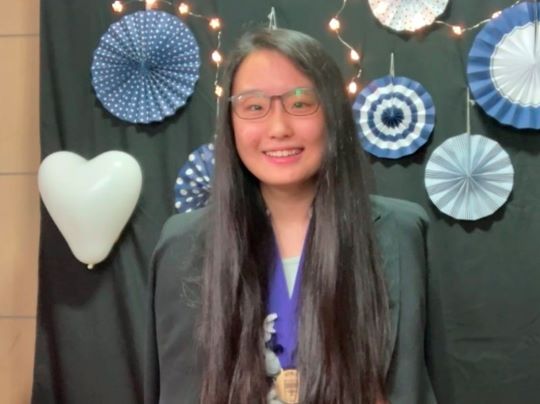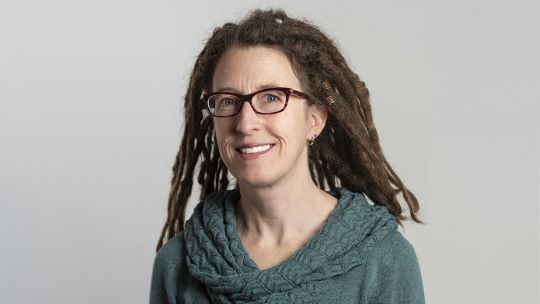RFS Briefings - March 30, 2021In honor of Women's History Month, T-Mobile for Business reached out to Dr. Shirley Jackson, president of Rensselaer Polytechnic Institute (RPI), to find out how she achieved her innovative academic and scientific accomplishments. She is the first African American woman to receive a doctorate of any kind from the university. In addition to the doctorate, Jackson has received 55 honorary doctoral degrees, numerous awards, and leadership roles across academia, government, and scientific industries.
Jackson spent her early career at Bell Labs where she helped produce discoveries that led to the fax machine, touch tone phones, solar cells, fiber optic cables, caller ID, and call waiting. Credit: Rensselaer Polytechnic Institute.
Congratulations to Katie Pollard, director of the Gladstone Institute of Data Science and Biotechnology, who has recently been elected into the College of Fellows of the American Institute for Medical and Biological Engineering (AIMBE). She is recognized for her pioneering development and application of novel statistical tools for studying genomic data. She and her team share these tools as open-source software that is now used by researchers around the world, enabling advancements in bioengineering and beyond. Katie Pollard, PhD, director of the Gladstone Institute of Data Science and Biotechnology Congratulations to Yunseo Choi, a senior at Phillips Exeter Academy in New Hampshire, who won first place in this year's Regeneron Science Talent Search STEM competition, run by the biotech company Regeneron and the Society for Science. She came up with a matching theory that can be applied to people looking for a life partner. Her algorithms could also be used to match organ donors with recipients, medical students with hospital rotations and cadets to branches of the military.
 Yunseo Choi won first place in this year's Regeneron Science Talent Search STEM competition. (Society for Science) Please continue to share important news and opportunities with us so that we may share it with you and others who are committed to supporting the careers of exceptional women in science.
Stay safe and sound, Karla Shepard Rubinger
NewsMeet the Pfizer scientists who helped develop the COVID-19 vaccine in Rockland. The Pfizer scientists reflected on the past year during a series of interviews at Pfizer's Pearl River site on March 11 — a year to the day that the World Health Organization declared COVID-19 a pandemic. Erasing women from science? There’s a name for that. Countless women scientists have been shunted to the footnotes, with credit for their work going to male colleagues. This is called the Matilda Effect. NIH Prize for Enhancing Faculty Gender Diversity: Women continue to be underrepresented at nearly every institution of higher education in the United States in the fields of biomedical, behavioral sciences, and engineering. This is particularly true among mid- to senior-level faculty ranks. The Prize for Enhancing Faculty Gender Diversity seeks to recognize those institutions whose biomedical and behavioral science departments, centers, or divisions have achieved sustained improvement in gender diversity. Women must not be obscured in science’s history. Nature spoke to several researchers, both women and men, who described the roots of some of the problems, and highlighted a number of efforts towards a more diverse, inclusive and global history of science. The researchers reiterated how much of the literature in science and engineering history is framed around a narrative of the ‘great hero scientist’ — a man who often makes breakthroughs by himself, on the strength of some special insight or individual genius. Where the records show collaborators, these people are also more likely to be men, according to an editorial. 4 women whose work won the Nobel prize for their male colleagues. Who were the women who bestowed a great benefit on humankind yet, perhaps because of unfounded social inequities, never earned a Nobel Prize? How Mary Wortley Montagu's bold experiment led to smallpox vaccine – 75 years before Jenner. It was a daring and dangerous experiment that paved the way for the development of the first safe vaccine and saved countless lives. Yet when Lady Mary Wortley Montagu deliberately infected her own daughter with a tiny dose of smallpox – successfully inoculating the three-year-old child in 1721 – her ideas were dismissed and she was denounced by 18th-century society as an “ignorant woman”, writes Donna Ferguson for The Guardian. Researchers co-led by Ana Moreno at the University of California San Diego (UCSD) have developed a non-permanent form of gene therapy for chronic pain that they suggest could offer a safer, non-addictive alternative to opioid drugs. Jennifer Doudna on the pandemic year: The power of mission-driven science. “The science behind a PCR-based Covid-19 test was right in our comfort zone, but spinning up a clinical laboratory was another matter entirely. Looking back, I’m still in disbelief at how quickly the team was able to safely overcome massive technical, logistical and physical barriers,” writes Jennifer Doudna, a biochemist known for her pioneering work in CRISPR gene editing, for which she was awarded the 2020 Nobel Prize in Chemistry along with Emmanuelle Charpentier. Carola Eisenberg dies at 103; helped start physicians for human rights. Dr. Eisenberg served as M.I.T.’s dean of student affairs from 1972 to 1978, the first woman to hold that position; she was also the first woman to be named to the university’s Academic Council. From 1978 to 1990 she was dean of student affairs at Harvard Medical School, again the first woman to be named to that office. Throughout her life she encouraged more women to get involved in the medical field. Credit, writes Sam Roberts in an article for The New York Times. Rosalind Cartwright, psychologist and ‘Queen of Dreams,’ dies at 98. Rosalind D. Cartwright, a renowned sleep researcher, studied the role of dreaming in divorce-induced depression, helped open one of the first sleep disorder clinics, and worked with sleep apnea patients and their frustrated spouses. ‘The Code Breaker’ tells the story of CRISPR pioneer Jennifer Doudna. The biography also delves into the ethics of gene editing. The book digs into the fierce patent battles that have ensued between the University of California (Doudna is at the Berkeley campus) and the Broad Institute of MIT and Harvard, where other researchers, most notably Feng Zhang, were also developing the gene-editing tool. Please visit the RFS website to hear her presentation last fall as the closing speaker for our Women in Science series with GEN. And a terrific interview with author Walter Isaacson appeared recently on GENLive. ChoKyun Rha, professor post-tenure of biomaterials sciences and engineering, dies at 87. ChoKyun Rha, an MIT professor post-tenure and a groundbreaker in biomaterials science and engineering, died March 2 in Boston. She was 87. She leveraged frontier tools of chemistry and biotechnology for the discovery of novel biomolecules and high-resolution molecular structure, function, and bioactivity determination. It's not lack of confidence that's holding back women in STEM. In a new study, researchers in Australia found that women students in STEM are equally if not more confident than men in their problem-solving and decision-making, goal-directed behavior, self-esteem, career exploration and career awareness. They were also more likely to have a "plan B" for their careers. Gianluigi Veglia sexually harassed his students and lab staff but wasn’t fired. “Increasing awareness about sexual harassment in the US has spurred a national dialogue about how to deal with harassers that extends to the chemical sciences. Universities regularly choose between firing professors who sexually harass their students and disciplining them but letting them stay. Veglia’s case is one example of how a judgment to sanction and retain a faculty member, combined with a lack of transparency, can fuel controversy long after the decision was made,” write Andrea Widener and Linda Wang in an article for C&EN. Women in Innovation and STEM Database at MIT announces fellowship program. WISDM, the Women in Innovation and STEM Database at MIT, celebrated the first anniversary of its digital launch on March 8 — International Women’s Day. To mark the occasion, the tremendous growth of the WISDM community, MIT Innovation Initiative (MITii), which manages the platform/community, announced the WISDM Fellowship Program for scientists interested in improving their public speaking capabilities. We were honored to have WISDM founder, Dr. Ritu Ramen, as an RFS speaker in 2019. Cambridge astrophysicist overlooked for Nobel prize inspiring new generation of female scientists. In 1967 Dame Jocelyn discovered a new type of star called a pulsar, one of the most significant scientific discoveries of the 20th century, but it was her male PhD supervisor who was awarded the Nobel prize for physics in 1974. “My parents had to fight to allow me into the science class which was for boys only... I reckon that one of the reasons that I made that discovery early on was because I was in a minority and I was working very, very hard to justify my position.... so it was because of my diversity that the discovery got made,” she said. She was a featured speaker at our recent end-of-year conference. Future of travel may be in the hands of this female teen scientist: Finding inspiration in Elon Musk’s Hyperloop, at the age of 13, Caroline Crouchley created a new concept for a cheaper and more sustainable train and became a finalist at the Discovery Education and 3M Young Scientist Challenge. Now 15, Caroline’s goal is to become an engineer and a scientist one day. Aspiring to study at MIT and Harvard, she wants to be “known for solving large problems facing our world, leaving the planet a better place and improve the lives of all people.” A new study from the laboratory of Rockefeller’s Leslie Vosshall helps explain why male mosquitoes leave humans alone. It appears that both mosquito sexes share the same neurons and brain structures needed to find humans, but that this hardware is hidden in the male mosquito brain, locked behind a simple genetic switch.
Marianna Limas, Social Media Manager
|


